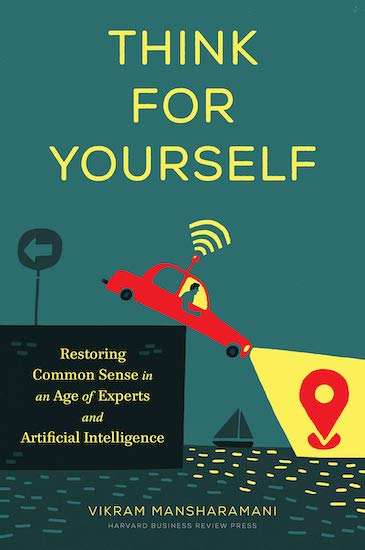In an age where endless streams of data, options, and information are available, it can feel like every choice — from what TV show to watch to how to invest our money — ought to be optimized, and yet making any choice, much less an ideal one, can seem completely overwhelming. How do we figure out what to do? Much of the time, we don’t. Instead, we outsource our thinking to technology, experts, and set protocols. This, my guest today says, is where some real problems start.
His name is Dr. Vikram Mansharamani and he’s a Harvard lecturer who studies future trends and risks, as well as the author of Think for Yourself: Restoring Common Sense in an Age of Experts and Artificial Intelligence. Today on the show, Vikram explains how our increasingly complex lives have led us to increasingly rely on algorithms, specialists, and checklists to make decisions, even though experts are best suited to untangling complications rather than complexities. We then discuss the issues that can therefore arise in relying on expert advice, including the siloing of information and the application of misdirected focus. Once we diagnose the problem (and how the problem can, for one thing, muddy medical diagnoses), we turn to the solution, and how we can harness the good that technology and experts can provide, without undermining our ability to still think for ourselves, by doing things like asking experts about their incentives, knowing our own goals, triangulating opinions, and crossing silos. We end our conversation with how the serendipitous discovery of perspectives that can come from flipping through a magazine and browsing a bookstore can be part of restoring self-reliant thinking in the 21st century.
If reading this in an email, click the title of the post to listen to the show.
Show Highlights
The problems with relying on experts and technology to make our choices for us The rise of complexity, and how that changes our world (and the difference between complex and complicated) Maximizing vs. understanding Can AI really solve all the problems it promises to?How software and optimization can instill FOMO on our choices The meaningless data of rankings and reviews Choice paralysis When experts should step back and view the world outside their silo When a helpful checklist can lead you astray How to manage your focus What a prostate cancer screening test ended up causing more harm than good What is the Peter Principle?How to be more self-reliant in the 21st century The serendipity of flipping through a magazine or browsing a bookstoreResources/People/Articles Mentioned in Podcast
BoombustologyHow Navigation Makes Us HumanHow the Internet Makes Our Minds ShallowEscape the AlgorithmLifehacking, A ReexaminationWhat Catastrophes Can Teach Us About How to Improve Our SystemsThe Pros and Cons of Outsourcing Your LifeThe Existential Threat of Big TechStop Hacking Your LifeMeditations on the Wisdom of ActionShadow Work and the Rise of Middle-Class SerfdomCuring Your Restlessness: Limiting Your ChoicesThe Power of ChecklistsEverything You Know About Cholesterol is WrongThe Great Prostate Mistake (and The Great Prostate HoaxThe Peter PrincipleThe Tao of Boyd: How to Master the OODA LoopConnect With Vikram
Vikram’s website
Vikram on Twitter

No comments:
Post a Comment